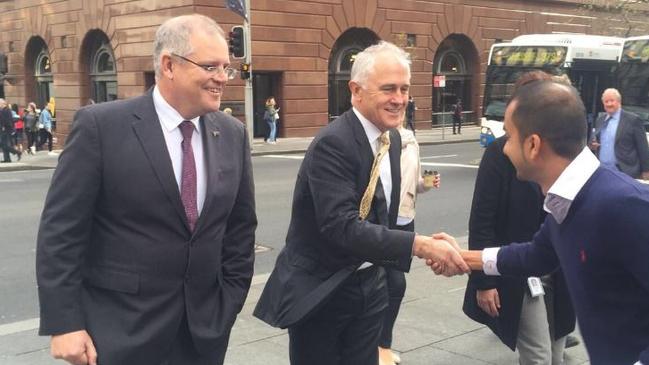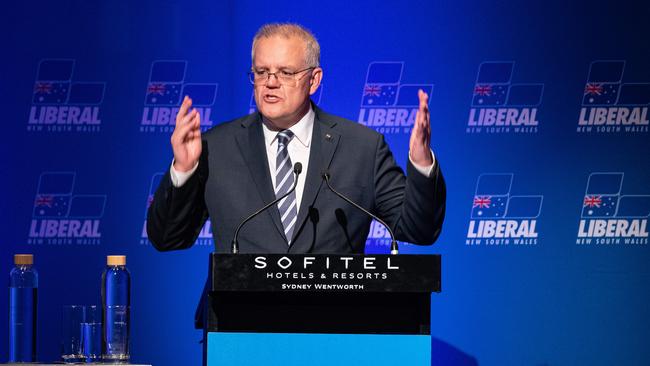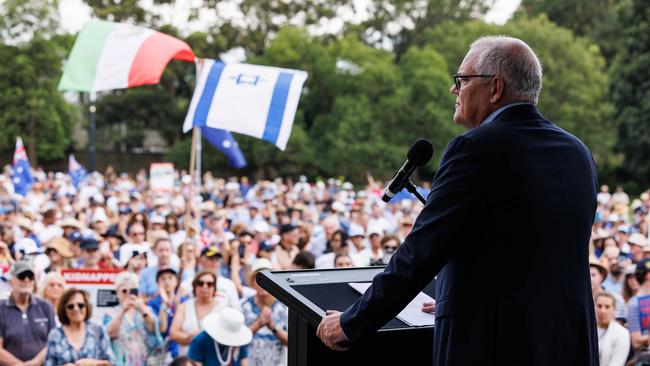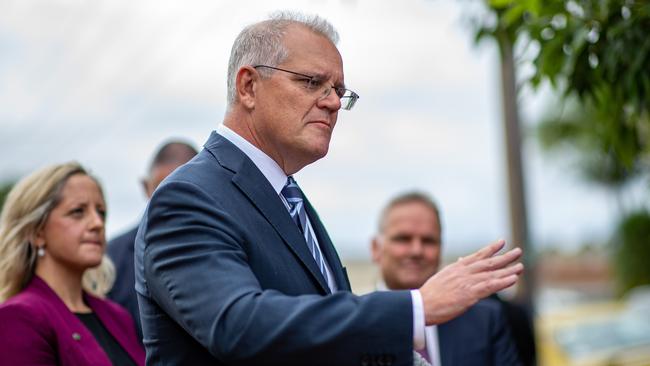Scott Morrison reveals how he came to be prime minister, toppling Malcolm Turnbull
In a book full of startling revelations, former Prime Minister Scott Morrison writes that Malcolm Turnbull advised him to go for the top job during the infamous ‘spill week’ of 2018.

Breaking News
Don't miss out on the headlines from Breaking News. Followed categories will be added to My News.
Former Prime Minister Scott Morrison says Malcolm Turnbull offered him his blessing to go for the top job during the infamous “spill week” of August 2018 that ended Mr Turnbull’s government and thrust Mr Morrison to the height of power.
The startling claim appears in Mr Morrison’s soon to be released memoir, Plans for Your Good: A Prime Minister’s Testimony of God’s Faithfulness, which hits bookstores this week and presents his Christian-infused perspective on four tumultuous years in power.
In a chapter title ‘I’ve Always Believed in Miracles’, Mr Morrison writes he held no designs on the prime minister’s office but Mr Turnbull told him he should go for the job following the first spill vote.
“Over the course of that week, I stood by the PM together with Julie (Bishop), the defence industry minister, Christopher Pyne and a few others,” he writes.
“Late on Wednesday evening, as events were moving away from us, Malcolm told me in his office that I should begin thinking about running if he wasn’t able to hang on.

“While I was ambitious and had hoped one day to reach the top spot, it was not my preferred time to become PM.
“I supported the PM and thoroughly enjoyed my job as treasurer.
Mr Morrison writes he encouraged Mr Turnbull to wait out the turmoil until parliament rose to “allow things to calm down”.
“We could then regroup in a couple of weeks’ time, when we returned,” he writes.
“I was still focused on getting the PM through the storm but Malcolm believed things had gone too far and would need to be resolved.”
He wrote he was surprised by Mr Turnbull’s decision to call for the signatures of a letter with the names of 43 Liberal MPs who wanted a new leader.
“He decided that if signatures of the majority of the party room came in, he would call the meeting,” Mr Morrison said.
“I assumed he would voluntarily vacate the leadership at this meeting, without the need for a ballot.
“At that point I said to the PM and others in the PM’s office, ‘Well, I need to get busy,’ and left.
“At that time, I believed the campaign to save the PM was over.”
Mr Morrison went on to win the ballot for leader after the second spill motion, replacing Mr Turnbull as Prime Minister and leading Australia from 2018 until his defeat at the 2022 election.

Each part of the book is infused with Mr Morrison’s deep Christian faith and he writes about how he looked to God for guidance during the storms of the week, when power was in flux.
“I had been praying about the situation all week,” he writes.
“I had been seeking the counsel and fellowship of Christian friends and mentors. I was talking to Jen. I was reading God’s Word. I weighed the practical possibilities and I had a pretty good sense of the numbers we could count on.
“I sought the peace of God that surpasses all understanding, and He provided it (Philippians 4:7).
“At each stage I sought to be sensitive to the promptings of the Holy Spirit.
“All of this was necessary and helpful, but at the end of the day I still had to make the final decision of faith through obedience.
“I had to decide whether to step up or step off.

“After careful consideration, I decided that the path of obedience was to step up.
“So I raised my staff and walked toward the sea.”
Mr Morrison’s tenure was marked by the global Covid pandemic, which struck in early 2020.
He writes he saw the sudden intrusion of the virus as a threat to Australia’s “survival”.
“We were advised by our health experts and officials that Australia could be facing the loss of 50,000 lives,” he writes.
“To put this in some perspective, 34,000 Australian lives were lost in World War II.
“We now knew we were facing the most significant challenge since that era. Politics no longer mattered. This was about Australia’s survival.
“We had to get Australia through. We saw the horror show unfolding in some of the most developed nations and cities in the world.
“New York, London, Rome, Paris – they were falling like dominoes.”

In one striking detail, Mr Morrison writes about directing an evacuation of Australians from Wuhan in China, the epicentre of the outbreak.
“Brave consular officials from our Department of Foreign Affairs jumped in a car and made their way to Wuhan to organise the uplift,” he writes.
“I called the CEO of Qantas … and asked him to organise flights to get our people out. He didn’t hesitate.”
Mr Morrison also said he took medication during his time in power to cope with the stress and anxiety, which he writes could feel “inescapable” and “overwhelming”.
“I had some experience with this as PM and sought help from my doctor in Canberra, who prescribed me with medication that I found very helpful,” he said.

“We are all human. My doctor was amazed I had lasted as long as I had before seeking help.
“Without this help, serious depression likely would have manifested.
“It wasn’t the difficulty of the pandemic or global challenges I faced in the job that had this impact on me.
“I would run hard at these challenges every day. In some ways, those challenges kept me sane. What impacted me was the combination of pure physical exhaustion with the unrelenting and callous brutality of politics and media attacks.
“As a politician, I know this goes with the territory. That’s not a complaint or even an accusation. It’s just reality.
“Politicians are not made of stone, yet they’re often treated as though they are, including by each other.”
* From Plans for Your Good: A Prime Minister’s Testimony of God’s Faithfulness by Scott Morrison, which will be published by Thomas Nelson US/HarperCollins on May 1.
Originally published as Scott Morrison reveals how he came to be prime minister, toppling Malcolm Turnbull





